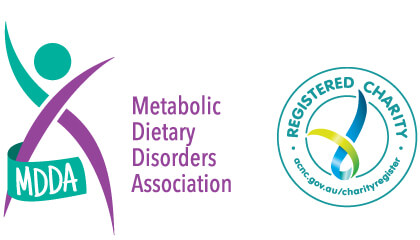Definition
Homocystinuria (HCU) is an autosomal recessive inherited metabolic disorder. It is based on a genetic defect of the cystathionine-ß-synthase. This disrupts the synthesis of cysteine from cystathionine, depending on the severity of the enzyme defect, to the accumulation of homocysteine in the plasma and homocysteine in the urine.
The lack of the enzyme prevents the body from processing methionine, an essential amino acid, from food containing protein. As a result toxic levels of harmful substances accumulate in the body and cause serious health problems.
There are multiple forms of Homocystinuria, each distinguished by their clinical signs and symptoms and underlying genetic basis.
Diagnosis
The condition is diagnosed during newborn screening via the heel prick test taken 48-72 hours after birth.
Prevalence
1:100,000 babies born in Australia and New Zealand.
Treatment for Homocystinuria
To treat homocystinuria, doctors restrict foods high in natural protein and provide L-amino acids and conditionally essential amino acids to maintain plasma total homocysteine levels as close to normal as possible. Avoiding catabolism and metabolic decompensation is very important with administration of pyridoxine (vitamin B6) and vitamin B12 injections. In addition, Betaine, hydroxocobalamin and vitamin C may improve homocysteine levels.
However, nearly one half of individuals affected with HCU benefit from Vitamin B6 supplementation. For the remainder, the current mainstay of treatment is a strict low protein diet coupled with supplementation with B6, B12, folate, and Betaine together with a ‘medical formula’. This treatment regime aides in the restoration of metabolic balance in the affected individual.
Support Links & Materials
HCU Fruit and Veg Counting Lists
HCU General Protein Counting Lists
